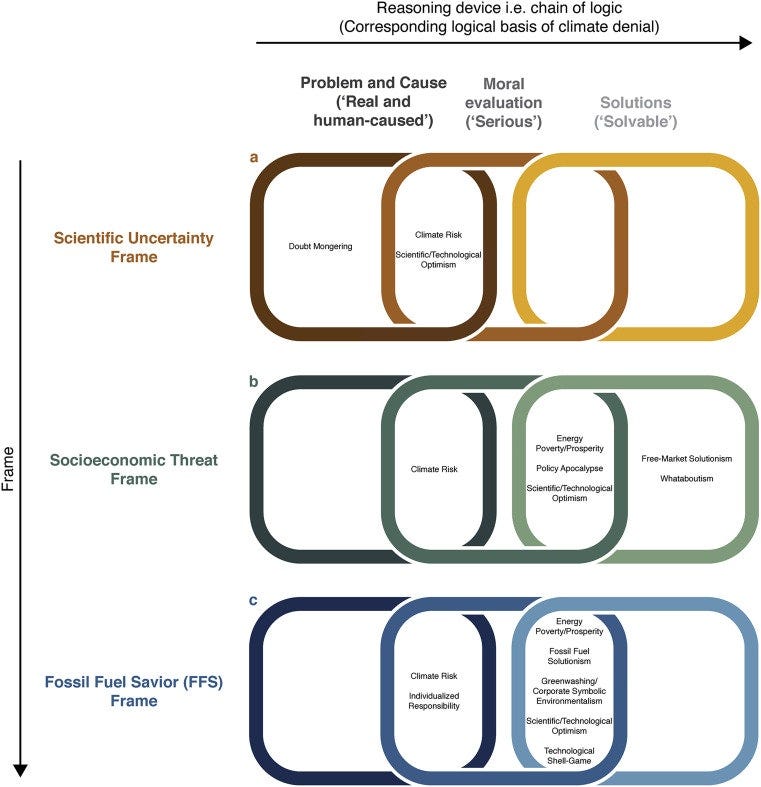Title: Unraveling ExxonMobil's Climate Rhetoric Through Frame Analysis
Written on
Chapter 1: Understanding ExxonMobil’s Climate Messaging
A recent investigation by Harvard scholars Geoffrey Supran and Naomi Oreskes marks the first computational linguistic exploration into the entirety of ExxonMobil’s climate communication history. Their findings indicate that ExxonMobil’s public statements on climate change closely resemble the propaganda used by the tobacco sector. Key insights include:
- ExxonMobil’s climate messaging often mimics tactics used by the tobacco industry.
- The language surrounding climate "risk" diminishes the urgency and severity of the climate crisis.
- The focus on consumer "demand" shifts the responsibility for climate issues onto individuals, rather than the fossil fuel industry.
- The "Fossil Fuel Savior" narrative justifies continued fossil fuel use while attributing blame to consumers.
This research scrutinizes two decades of ExxonMobil's language in advertising and public discourse, revealing a deliberate strategy to redirect accountability for climate change from corporations to the public. The authors provide extensive evidence that highlights how ExxonMobil’s climate communication strategies are reminiscent of the tobacco industry's efforts to downplay health risks.
Supran and Oreskes’ study is groundbreaking, providing a computational framework to analyze how ExxonMobil has strategically used language to influence public discussions on climate change.
Section 1.1: The Concept of Frame Package Analysis
Curious about the methodology used, I delved into the concept of "frame package analysis," which combines qualitative and computational techniques for analyzing communication strategies. Frames are critical in ecolinguistics and environmental discourse, particularly in understanding how fossil fuel companies manipulate language to shape public perceptions regarding environmental challenges and the associated responsibilities.
An example from Julie Doyle’s qualitative analyses reveals how corporations like BP have introduced terms like "personal carbon footprint" to shift blame away from themselves and onto consumers.
In a compelling illustration within the study, the authors depict how their innovative approach clarifies three significant rhetorical frames that ExxonMobil has utilized to promote its agenda of climate denial and delay:
- The Scientific Uncertainty Frame
- The Socioeconomic Threat Frame
- The Fossil Fuel Savior Frame
These frames articulate ExxonMobil’s narratives regarding the true nature and causes of the climate crisis, as well as the supposed optimal solutions for it.

The authors' analysis categorizes these frames within a “Frame Matrix,” comprising the key phrases and terminologies ExxonMobil employs to deflect responsibility for climate change, promote fossil fuel interests, and project a belief in technological salvation.
Their detailed methodology highlights how this mixed-method approach can reveal complex, often subtle patterns in language that might otherwise go unnoticed.
The primary conclusion?
“The fossil fuel sector is leveraging the nuanced politics of language to minimize its role in the climate crisis and to obstruct climate-related litigation, regulation, and activism.” – Geoffrey Supran and Naomi Oreskes
Chapter 2: Next Steps and Further Insights
Geoffrey Supran discusses his findings on Bloomberg News, shedding light on the communication strategies of ExxonMobil. This news segment serves as an excellent example of researchers effectively conveying their findings to the media.
As a researcher and writer, I am keen to explore the intersections of communication, culture, and the environment. Join me in my weekly digest to discover more insights and tools in EcoWriting and environmental communication.